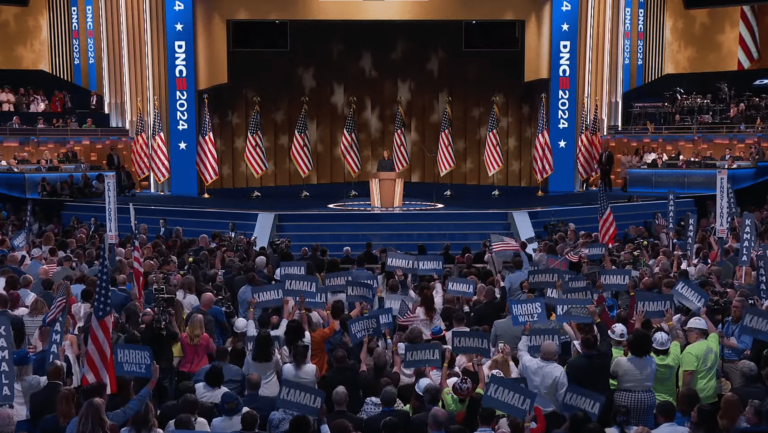The Democratic presidential nominee detailed some of her gun policy vision in a wide-ranging Tuesday interview, emphasizing her support for an “assault weapons” ban and talking about a new policy for the first time since taking over the top of the ticket.
Kamala Harris explained what kind of gun restrictions she’d pursue if elected president during a lengthy sitdown with the National Association of Black Journalists. She brought up her support for a ban on the sale of popular firearms, such as the AR-15 rifle, and universal background checks. But she also talked for the first time in a high-profile interview about funding for less controversial policies like community violence interruption programs.
Tonya Mosley, host of NPR’s Fresh Air, pressed Harris for specifics on how she would handle gun violence, especially crimes carried out with handguns. Harris didn’t respond to Mosely’s specific point about handguns at first, instead repeating a line about her gun ownership and banning assault weapons that she has used several times since last week’s debate–including in an interview with a Philadelphia news station on Friday.
“I am a gun owner, and Tim Walzs is a gun owner, and we’re not trying to take anybody’s guns away from them, but we do need an assault weapons ban,” Harris said. “Assault Weapons are designed to kill a lot of human beings quickly and have no place on the streets of a civil society.”
When Mosley reiterated that her question was about handguns, Harris argued a universal background check law was one way to stop handguns from being used in crimes.
“It’s just reasonable you might want to know before someone can buy a lethal weapon if they’ve been found by a court to be a danger to themselves or others,” she said. “You might just want to know.”
Mosley pressed again, noting that many of the handguns used in homicides in places like Philadelphia are not purchased legally. Harris responded by blaming gun shows, in particular, for illegal gun sales.
“I myself protested at a gun show probably 10, 15 years ago about the gun show loophole and why we need to close that,” Harris said. “Because what ends up happening is that gun shows at flea markets, gun dealers are not, under existing law in the past, required to register their sales. And so you are exactly right that a lot of homicides, for example, a good number of them, I don’t have the statistic in the front of my mind, are committed with illegally purchased guns, and that’s why we need to address each entry point in the issue, including universal background checks, closing the gun show loophole.”
However, there is little evidence to suggest criminals obtain firearms through sales at gun shows or from sellers who are unaware they are selling to somebody who can’t legally buy a gun. In a 2016 University of Chicago survey of inmates convicted of gun crimes, the vast majority said they did not purchase their firearms from licensed dealers or at gun shows. Instead, they relied on obtaining guns from people they knew, illegal street dealers, or by stealing them.
Additionally, despite what Harris implies, gun shows do not have any special carve out under federal law. Instead, the law regulates commercial firearms sales. Anyone “engaged in the business” of dealing firearms must obtain a license from the federal government. Anyone with a federal firearms license must conduct background checks on customer sales regardless of where the transaction takes place–whether at a gun store, online, or at a gun show.
Federal law does not regulate used sales between people who aren’t licensed dealers. So, most states do not require a background check on those kinds of sales, which can happen at many gun shows.
The Biden Administration has sought to expand who the ATF considers “engaged in the business” and must obtain a license by using federal rulemaking. However, it has faced legal challenges and was partly blocked by a federal judge earlier this year.
15 states and the District of Columbia have adopted universal background check laws. Those require that all gun sales, and most gun transfers, be processed through a licensed dealer and subject to a background check. Those laws often include varying carveouts for sales or transfers between family members or even friends. Harris supports adopting a similar policy at the federal level, but, as with her other gun policies, she hasn’t released a proposal with detailed language.
Mosley noted the debate surrounding guns in America has solidified around two gun control policies and asked if Harris had any other ideas beyond those.
“Every time we bring up this issue of gun violence, universal background checks comes up, and a ban on assault weapons,” Mosley said. “Are there other solutions that you’re also thinking about that will get at this issue?”
Harris pointed to mental health treatment and community violence intervention programs as other measures she believes the federal government should implement alongside the gun restrictions she’s backing.
“As Vice President with the President, we were able to pass the first meaningful gun safety legislation in 30 years,” she said in reference to 2022’s Bipartisan Safer Communities Act. “And part of what that involved was millions and millions of dollars to put more mental health counselors in public schools. Because we know that there is an aspect of this that is about treating the trauma and dealing with it at its source before it ends up manifesting itself in a problem.”
She argued more funding was necessary for violence prevention projects.
“There is the work that we need to do that is about putting resources into communities around violence prevention,” Harris said. “I’ve been a big advocate of that for years, which includes what we need to do around putting resources into community-based intervention that is not just requiring on the good people in the community to volunteer to do the intervention but actually paying people to do it because it’s a full-time job.”
However, she argued those weren’t new ideas, and many of the solutions to gun violence have already been identified.
“There are very few solutions that we haven’t thought of,” Harris said. “We need to put the resources into them.”






